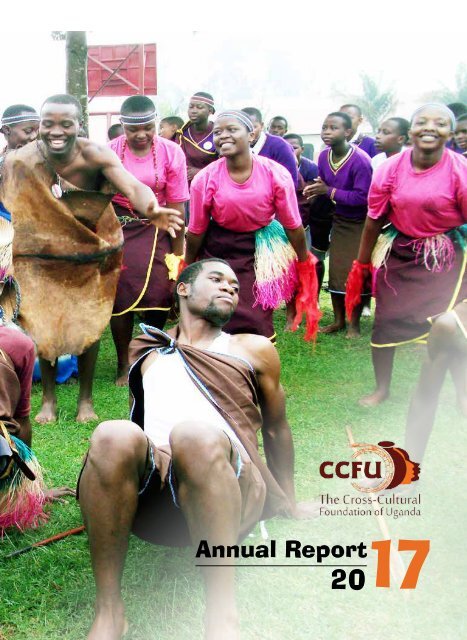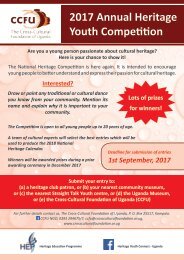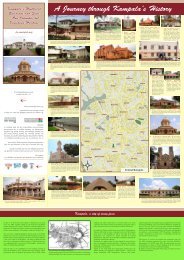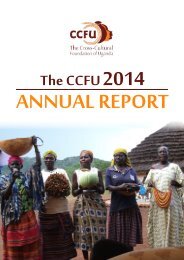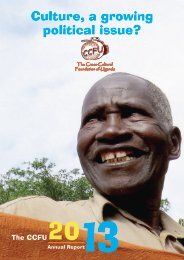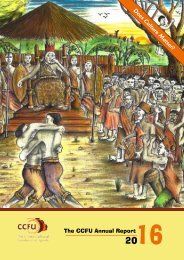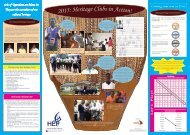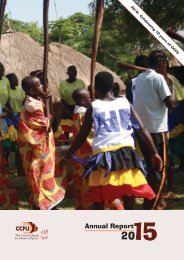Create successful ePaper yourself
Turn your PDF publications into a flip-book with our unique Google optimized e-Paper software.
i
Pastore Draolega, curator at the Madi Community Museum, with the UNESCO-inscribed o’di lyre<br />
Welcome…<br />
Page<br />
From our Board Chair and Executive Director 2<br />
<strong>2017</strong>: changing contexts, activities and prospects:<br />
a. Promoting a ‘Culture in Development’ approach 3<br />
b. Cultural rights, governance and managing diversity 6<br />
c. Cultural heritage preservation and development 10<br />
<strong>The</strong> year at <strong>CCFU</strong> 13<br />
Latest publications 15<br />
11 years of <strong>CCFU</strong> in figures 16<br />
A word of appreciation 17<br />
1
A word from…<br />
Our Board Chair<br />
We all like to develop and transform our lives and<br />
societies for the better. However the dominant<br />
development-model that permeates and influences<br />
our ways of thinking, living, doing and relating,<br />
treats our cultures and values as, at best, an<br />
exploitable resource, or at worst, an impediment to<br />
“modernisation”. Consequently the progress of each<br />
successive generation is measured by how far it has<br />
culturally distanced itself from its roots including the<br />
umbilical or mother tongues. This is one way in which<br />
African creativity, knowledge and value systems have<br />
been stunted. By the same token, the doors have<br />
opened wider to the generation and veneration of<br />
cultural, spiritual, political, technological and business<br />
“copycats” that pass for<br />
“role models”, “success<br />
stories” and “benchmarks”<br />
in our country.<br />
It is against this background<br />
that the spirit and scope of<br />
<strong>CCFU</strong>’s activities deserve<br />
the applause and support<br />
of all “cultural activists” and other partners as a vital<br />
contribution not just to “culture-in-development”<br />
but to the deeper process of cultural restitution and<br />
epistemic justice.<br />
Prof. Luutu Mukasa<br />
Our Executive Director<br />
It is when the right to culture is restricted or denied<br />
that the true value of culture isappreciated. Despite<br />
the drive for economic empowerment, the Cross-<br />
Cultural Foundation of Uganda has encountered many<br />
communities across the country that consistently<br />
express anxiety about the loss of their cultural heritage<br />
for various reasons. Indigenous minority communities<br />
are for instance constantly struggling for recognition<br />
of their cultural identity and the restoration of their<br />
dignity amidst oppression and marginalisation.<br />
In <strong>2017</strong>, we however witnessed the spirited<br />
protection of ancestral land, demands for access to<br />
traditional knowledge, cultural spaces and cultural<br />
expressionsthrough language, social and religious<br />
practices by large and small communities alike –all<br />
challenging Ugandans’ widespread<br />
opinion that culture is irrelevant<br />
in the current context. Changing<br />
perceptions requires concerted<br />
efforts and partnerships and<br />
solidarity at national and<br />
international levels therefore<br />
remains an essential mode of<br />
operation for civil society and<br />
heritage - focused organisations.<br />
This report illustrates how the Foundation has<br />
contributed to preserving Uganda’s diverse cultural<br />
heritage in collaboration with its different partners<br />
and associates.<br />
Emily Drani<br />
2
<strong>2017</strong>: changing contexts,<br />
activities and prospects<br />
a. Promoting a “Culture in<br />
Development” approach<br />
3
ÂÂ<strong>The</strong> programme context<br />
An appreciation of culture and its contribution to<br />
development is becoming more evident, nationally<br />
and beyond. States across the globe have ratified legal<br />
instruments to protect their natural, built and intangible<br />
cultural heritage, to promote cultural expressions and<br />
cultural diversity, and to protect biosphere reserves.<br />
<strong>The</strong> Sustainable Development Goals make explicit<br />
reference to the role of culture in development.<br />
Uganda’s Constitution recognises “cultural and<br />
customary values that are consistent with the fundamental<br />
human rights and freedoms, human dignity and<br />
democracy…which may be developed and incorporated<br />
in all aspects of Ugandan life”. In spite of this, Ugandans’<br />
common understanding of culture often remains<br />
narrowly focused on music, the performing arts,<br />
traditional food and dress, art and crafts and on a<br />
few cultural sites, all of which contribute visibly to<br />
cultural tourism and employment. <strong>The</strong> contribution<br />
of cultural values, systems, knowledge and resource<br />
persons to social cohesion and nation building are<br />
rarely explored. <strong>The</strong> link with education and moral<br />
upbringing, peaceful co-existence, a sense of belonging<br />
and dignity, creativity and wealth creation are similarly<br />
overlooked.<br />
ÂÂ<strong>CCFU</strong>’s interventions<br />
<strong>The</strong> Foundation’s mission and strategies are premised<br />
on the conviction that the positive aspects of culture<br />
can contribute to social transformation and sustainable<br />
development. In 2006, <strong>CCFU</strong> conceived the notion of<br />
a ‘Culture in Development’ approach and has since<br />
refined this approach to respond to issues arising<br />
in the local context such as managing cultural<br />
diversity, cultural controversies linked to cultural<br />
rights vs. human and women’s rights, and a deeper<br />
understanding of intangible cultural heritage.<br />
<strong>The</strong> Foundation utilises its training guides to address<br />
questions raised by diverse stakeholders regarding the<br />
link between culture and development. <strong>CCFU</strong> also<br />
offers tailor-made training to support development<br />
<strong>CCFU</strong> therefore seeks to contribute to a<br />
better understanding of culture’s contribution<br />
to development through research and capacity<br />
building. This reflects the limited literature and<br />
experience available from development partners<br />
on integrating culture in development thinking<br />
and practice. In <strong>2017</strong>, <strong>CCFU</strong> produced a case<br />
study entitled: “In the Name of Conservation –<br />
<strong>The</strong> eviction of the Batwa from Semuliki Forest”,<br />
examining the consequences of advancing a<br />
conservation agenda which is oblivious to cultural<br />
heritage.<br />
This study, the 24 th produced by <strong>CCFU</strong> to date,<br />
describes the consequences of evicting the Batwa<br />
community in Bundibugyo from the forest, the<br />
negative impact this had on their livelihood and<br />
cultural heritage, and the policy vacuum that made<br />
this possible.<br />
4
partners integrate culture in development practice<br />
by reviewing their strategic plans, existing development<br />
programmes and approaches. In <strong>2017</strong>, <strong>CCFU</strong><br />
for instance worked with the Alur Kingdom to better<br />
define and design strategies to address elements of<br />
culture in their strategic plan. A Culture in Development<br />
training course for development practitioners is<br />
planned for 2018.<br />
Working with the Alur Kingdom to review<br />
its Strategic Plan<br />
ÂÂReflections and prospects<br />
Since its inception in 2006, <strong>CCFU</strong> has noted an<br />
increase in the numbers, activities and visibility of<br />
heritage-focused organisations in Uganda, ranging<br />
from local cultural associations and community<br />
museums to cultural centres and other cultural<br />
organisations. While this reflects the desire and an<br />
enhanced confidence in promoting culture, there is a<br />
persistent lack of technical expertise in heritage<br />
development, management and promotion. <strong>CCFU</strong><br />
intends to continue using knowledge generated from<br />
its research and activities to provide a basis for<br />
capacity building, influencing perceptions on the<br />
relevance of culture, and influencing the integration of<br />
cultural heritage in relevant national development<br />
policies and programmes. Other interventions to<br />
promote heritage education in secondary school and<br />
in universities in Uganda are presented in the other<br />
sections of this report.<br />
To fully harness cultural resources, <strong>CCFU</strong> will continue<br />
to campaign for a well-financed and fully-fledged State<br />
organ to foster technical and financial investment<br />
in heritage education, heritage infrastructure<br />
development, preservation of buildings of historical<br />
and cultural significance, cultural tourism, and the<br />
promotion of cultural rights for all people in Uganda.<br />
5
. Cultural rights, governance and<br />
managing diversity<br />
6
ÂÂ<strong>The</strong> programme context<br />
Although Uganda has ratified international Conventions<br />
that provide for the recognition of cultural rights, little<br />
has been done to ensure their realisation. Cultural<br />
rights rarely feature on the national agenda, as<br />
reflected in the very limited commitments made in the<br />
national budget towards the cultural sector and the<br />
lack of a dedicated ministry for culture to drive this<br />
agenda. Few Ugandans are conversant with cultural<br />
rights and the transmission of the cultural practices,<br />
norms and values continues to be affected by various<br />
factors, such as certain religion creeds that demonise<br />
culture, the HIV/AIDs crisis and civil strife that have<br />
claimed the adults who are the gatekeepers of cultural<br />
information, and western-type education that views<br />
culture and traditional practices as backward.<br />
Uganda nevertheless hosted the 3 rd East African<br />
JAMAFEST Festival in <strong>2017</strong> and showcased its rich<br />
cultural diversity to the world. <strong>The</strong> main focus was on<br />
culture and the creative industries and <strong>CCFU</strong> delivered<br />
a paper to reflect on progress made to promote<br />
indigenous knowledge in traditional medicine. <strong>2017</strong><br />
also witnessed increased participation of Uganda’s<br />
diverse kingdoms and other cultural institutions in<br />
highlighting the relevance of culture in modern times<br />
by organising cultural galas, celebrating traditional<br />
cultural events and participating in delivering poverty<br />
reduction projects in their communities.<br />
ÂÂ<strong>CCFU</strong>’s interventions<br />
Throughout the year, <strong>CCFU</strong> has been actively<br />
promoting the cultural rights of Ugandans, with a focus<br />
on women and youth, and on indigenous minority<br />
groups.<br />
Women and cultural rights: Culture has often been<br />
blamed as the cause for women’s rights violation. In<br />
partnership with Diakonia, <strong>CCFU</strong> conducted a research<br />
effort in Gulu, Kitgum and Lamwo districts to establish<br />
the existence of culturally-defined rights of women<br />
among the Acholi and to explore their potential to<br />
empower women and girls. <strong>The</strong> research revealed the<br />
existence of a wealth of avenues for the protection<br />
and promotion of women’s and girls’ rights, including<br />
women’s rights to a violence-free environment, their<br />
authority over economic production, and their voice<br />
to contribute to decision making in both public and<br />
private spheres. Three chiefdoms, in partnership with<br />
<strong>CCFU</strong>, are now piloting initiatives to use such rights<br />
to promote women’s and girls’ empowerment. To<br />
guide this effort, <strong>CCFU</strong> supported the community to<br />
develop two booklets: a Cultural Leaders’ Handbook<br />
on promoting women’s rights as defined by Acholi<br />
culture and a practical reference handbook for women<br />
and girls on their culturally-defined rights.<br />
Indigenous Minority Groups (IMGs) and their oral<br />
history: <strong>CCFU</strong> supported various efforts to promote<br />
the cultural rights of IMGs, who are among Uganda’s<br />
most marginalised communities. To operate in a<br />
Bishop Ochola from the Acholi Religious Leaders Peace Initiative at the launch of the <strong>CCFU</strong> report on<br />
women’s rights and Acholi culture<br />
7
<strong>The</strong> Batwa delegation at the advocacy meeting with district leaders in Bundibugyo<br />
coordinated manner, the IMGs in the Rwenzori and<br />
Karamoja regions were supported to create platforms<br />
through which they will engage with the majority<br />
communities, as well as local and national governments<br />
on various cultural rights issues. In Bundibugyo district,<br />
policy makers and implementers, as well as<br />
representatives from the Batwa community came<br />
together and the former made concrete commitments<br />
to address the deficit in the realisation of human<br />
rights, especially of the Batwa. <strong>CCFU</strong> also prompted<br />
the establishment of a National Coalition for the<br />
Rights of Indigenous Minority Groups. With support<br />
from Minority Rights Group, the<br />
coalition has supported a policy<br />
dialogue between IMG representatives<br />
and Members of Parliament. A press<br />
statement calling upon government to<br />
respect the rights of IMGs and a<br />
commitment by the Equal Opportunities<br />
Commission to uphold these was made.<br />
As part of the efforts to preserve the<br />
heritage of the IMGs, <strong>CCFU</strong> also<br />
produced and disseminated various<br />
materials on the oral history of the<br />
Batwa. It is currently supporting the<br />
documentation of the history of the<br />
Ngokutio and Lendu people in<br />
Northern and North-Western Uganda.<br />
Youth and women cultural entrepreneurship projects:<br />
Can culture help realise rights by bringing food on<br />
the table? In <strong>2017</strong>, 5 experimental groups of youth<br />
and of women from IMGs were supported to enrich<br />
their culture-related enterprises. Improved incomes<br />
from crafts, traditional music and dance have enabled<br />
young people to re-consider their views about culture<br />
and how it can contribute to sustainable economic<br />
development.<br />
<strong>The</strong> Rwebisengo Widows’ Cultural Association in their craft shop<br />
8
Culture and Governance:<br />
Culture plays a role in achieving<br />
sustainable development.<br />
This is the case in the latest<br />
priority for Uganda’s economy,<br />
the oil and gas sector. <strong>CCFU</strong>,<br />
in partnership with ActionAid<br />
Uganda, supported Bunyoro-<br />
Kitara Kingdom, Ker Kwaro<br />
Acholi and Alur Kingdom to<br />
develop guidelines for their<br />
engagement with oil extractive<br />
companies, in order to protect<br />
the cultural heritage of the<br />
concerned communities. <strong>The</strong>se<br />
guidelines were launched by the<br />
prime ministers of the three<br />
institutions, in the presence<br />
of Ministry of Energy and<br />
Oil Company officials. Other<br />
cultural institutions have been supported in various<br />
ways to strengthen their governance structures, such<br />
as the Madi Chiefdom, whose leaders have been<br />
assisted to develop a clan leaders’ charter.<br />
Mainstreaming cultural rights: After the support<br />
<strong>The</strong> Prime Ministers of Bunyoro-Kitara Kingdom, Ker Kwaro Acholi and<br />
Alur Kingdom launch the guidelines by cultural institutions for oil and<br />
gas companies<br />
provided to a number of human rights organisations<br />
to build their capacity in appreciating cultural rights<br />
and incorporating them in their practice, some<br />
organisations have progressed in this respect, as<br />
established during the post training follow-ups<br />
conducted in <strong>2017</strong>.<br />
ÂÂReflections<br />
Despite challenges in promoting poorly appreciated<br />
cultural rights, some progress is being made and, with<br />
the necessary political will, more can be achieved.<br />
This would however depend on changing Ugandans’<br />
perceptions and to emphasise the need to embrace<br />
cultural rights as a lever for sustainable development.<br />
Targeting young people to embrace their cultural<br />
heritage and embedding this in both formal and nonformal<br />
education is also required. At the national level,<br />
linking culture to entrepreneurship and national socioeconomic<br />
development is needed, requiring individuals,<br />
communities, cultural institutions and government to<br />
pull their efforts together. It is our collective duty to<br />
bring this to fruition.<br />
9
c. Cultural heritage preservation<br />
and development<br />
10
ÂÂ<strong>The</strong> programme context<br />
Although the preservation and promotion of Uganda’s<br />
cultural heritage is supported by various legal<br />
instruments, our cultural and natural heritage is under<br />
threat. Historic buildings are replaced with shopping<br />
malls; natural forests are replaced with farms; swamps<br />
are reclaimed; cultural sites are encroachment upon<br />
and rarely documented. Policy guidelines are lacking,<br />
and development initiatives are seldom preceded with<br />
a social and cultural heritage impact assessment, so<br />
risk mitigation measures are not in place. Financial<br />
support from government and other sources towards<br />
the preservation and promotion of culture continues<br />
to be insufficient, in spite of the urgent work that<br />
needs to be undertaken to preserve our heritage. In<br />
addition, the transmission of indigenous knowledge<br />
and skills is challenged by the introduction of formal<br />
education at the expense of non-formal mechanisms.<br />
ÂÂ<strong>CCFU</strong>’s interventions<br />
Given this context, <strong>CCFU</strong> works with youth and<br />
community museums to defend their cultural heritage,<br />
while spearheading the protection of our built heritage.<br />
Heritage Education: in <strong>2017</strong> 71 teachers and other<br />
resource persons from Mpigi, Kabarole, Moroto,<br />
Napak and Masaka were trained to support secondary<br />
school cultural heritage clubs. This brought the number<br />
of clubs to 130 in various parts of Uganda. Young<br />
people were involved in two competitions: the<br />
National Youth Cultural Heritage Competition, whose<br />
theme this year was to illustrate their traditional<br />
dances, with the best entries used for the 2018<br />
Heritage Calendar. An International African Cultural<br />
Heritage Competition also electronically brought<br />
together members of school heritage clubs in Uganda,<br />
Sierra Leone and Zimbabwe who produced short<br />
videos to highlight their most interesting club activities.<br />
An awarding ceremony was held to award the 13<br />
winners of the national competition and the 2 winners<br />
of the international contest. To promote intangible<br />
cultural heritage (ICH) education in Uganda’s<br />
universities, <strong>CCFU</strong> started work in partnership with<br />
Kyambogo University, Kabale University, Uganda<br />
Martyrs’ University, and the Islamic University in<br />
Uganda to develop a course on ICH and sustainable<br />
development.<br />
<strong>CCFU</strong> Board chair Prof. Luutu Mukasa hands over a certificate to the overall winner of the National Youth<br />
Heritage Competition, Bridget Ategeka from Rubaga Girls’ Secondary School<br />
11
Nyamarunda historical site handed over to Bunyoro<br />
Kitara Kingdom officials<br />
Protecting our built heritage: In <strong>2017</strong>, <strong>CCFU</strong> pursued<br />
work with the Kampala Capital City Authority to<br />
develop a draft Ordinance to protect historic buildings<br />
in the city; information materials and plaques for the<br />
Luke and Katherine Wards of Mengo Hospital and Ham<br />
Mukasa House in Mengo were developed and unveiled<br />
to the public. <strong>CCFU</strong> also took part in campaigns to<br />
safeguard the Uganda National Cultural Centre,<br />
commonly known as the National <strong>The</strong>atre. Planning<br />
for the protection and promotion of a heritage site<br />
near Kampala, the home of Sir Apollo Kaggwa, the<br />
famous 19 th century political leader and ethnographer,<br />
was also undertaken. Elsewhere, <strong>CCFU</strong> supported<br />
the Kalisizo urban authority, which passed a bye-law<br />
to protect the Namagoma Forest. <strong>The</strong> tomb of King<br />
Kyebambe III in Nyamarunda, which <strong>CCFU</strong> supported<br />
the Greater Kibaale District Heritage Development<br />
Committee to renovate, was handed over to Bunyoro<br />
Kitara Kingdom and its Prime Minister pledged to<br />
maintain the site.<br />
Community Museums: <strong>CCFU</strong> continued to host the<br />
Uganda Community Museums Association coordinator<br />
and provided technical support to the Association’s<br />
regional exhibitions in Fort Portal and Iganga. A <strong>CCFU</strong><br />
volunteer also helped several museums to improve on<br />
their presentation and management.<br />
H.E the Ambassador of<br />
Ireland, Donal Cronin,<br />
the <strong>CCFU</strong> Executive<br />
Director and H.E. the<br />
High Commissioner of<br />
the United Kingdom,<br />
Peter West, unveil the<br />
information board at<br />
Mengo Hospital<br />
ÂÂReflections<br />
Our cultural heritage remains at great risk of<br />
disappearing. A listing mechanism to protect historical<br />
sites and buildings is urgently needed and the capacity<br />
of all organisations involved in this field, including<br />
Community Museums must be strengthened. This<br />
underlines the prerequisite for a centralised wellresourced<br />
government entity – a Ministry of Culture<br />
– to protect our national cultural and natural heritage,<br />
as well as the long term necessity to involve young<br />
people in promoting cultural heritage, as the primary<br />
target of sociocultural (r)evolutions and as Uganda’s<br />
upcoming policy makers and implementers.<br />
12
<strong>The</strong> year at <strong>CCFU</strong><br />
ÂÂ<strong>The</strong> context<br />
<strong>2017</strong> proved to be a challenging year for NGOs in<br />
Uganda. <strong>The</strong> global context militated against donor<br />
support for Ugandan organisations as the richer<br />
nations became increasingly introspective. <strong>The</strong> “NGO<br />
climate” was also marked by increasingly strict<br />
regulations imposed by Government on civil society<br />
organisations active in the country, while muzzling<br />
advocacy work on governance and human rights by<br />
closing down or intimidating several NGOs.<br />
ÂÂOur national and international linkages<br />
In this context, working with others assumes its full<br />
importance. Throughout <strong>2017</strong>, <strong>CCFU</strong> has continued<br />
to embrace its national and international partnerships.<br />
Through its membership of the National NGO Forum<br />
and of the Human Rights Network, the Foundation<br />
participated in defending the essential civic space that<br />
is the hallmark of a developing, democratic society and<br />
will continue to do so.<br />
<strong>CCFU</strong> is accredited to the UNESCO Intergovernmental<br />
Committee for the Safeguarding of the Intangible<br />
Cultural Heritage (ICH). We attended the 12 th session<br />
of the Committee in South Korea, presented a paper<br />
on traditional medicine and participated in the ICH<br />
NGO Forum symposium on this occasion.<br />
<strong>CCFU</strong> is also a member of the International National<br />
Trusts Organisation (INTO). INTO made <strong>CCFU</strong>’s<br />
presence at the 17 th International Conference of<br />
National Trusts in Indonesia possible. This was an<br />
eye-opening and engaging event, at which <strong>CCFU</strong><br />
made presentations on its work with youth and with<br />
indigenous minorities.<br />
Delegates at the 17th International Conference of National Trusts, Indonesia<br />
13
ÂÂ<strong>The</strong> <strong>CCFU</strong> Board of Trustees<br />
Our Board of Trustees continued to provide very<br />
valuable technical and advisory assistance to the<br />
Foundation throughout the year. It currently consists<br />
of Prof. Luutu Mukasa (Chair), Ms. Regina Bafaki, Ms.<br />
Rose Agoi, Ms. Grace Aulo, Ms. Rosie Agoi, Mr. Thomas<br />
Okoth Nyalulu, Mr. Cato Lund and Emily Drani as<br />
Secretary.<br />
ÂÂ<strong>The</strong> <strong>CCFU</strong> team<br />
After 11 years of dedicated and appreciated service,<br />
<strong>CCFU</strong> was sad to see its Finance and Administration<br />
Officer, Petwa Oselle leave the Foundation. We<br />
welcomed Haddijah Luwedde, another experienced<br />
finance officer, who joined our team to replace her.<br />
<strong>CCFU</strong> was privileged this year to host Beatrice<br />
McDermott, a volunteer to support our cultural<br />
heritage programmes. At <strong>CCFU</strong>, Beatrice was<br />
instrumental in supporting the Foundation’s work with<br />
community museums, providing technical assistance to<br />
their management for visibility and sustainability.<br />
We look forward to future partnerships with interested<br />
and qualified individuals who wish to contribute to the<br />
promotion of culture and development.<br />
<strong>The</strong> <strong>CCFU</strong> team at the Foundation offices, January 2018<br />
14
Our most recent publications<br />
Throughout the year, <strong>CCFU</strong> continued to produce<br />
publications to sustain its agenda and illustrate various<br />
aspects of Culture in Development. <strong>The</strong>se are available<br />
at our offices and through our website.<br />
And a DVD:<br />
15
11 years of <strong>CCFU</strong> in figures<br />
2600+ students in over 130 school heritage clubs<br />
supported by <strong>CCFU</strong> in Uganda<br />
260 Patrons of school cultural heritage clubs trained<br />
54 Kampala’s historical buildings and sites on an<br />
annotated map produced by <strong>CCFU</strong><br />
34 Districts where <strong>CCFU</strong> is working<br />
25 Indigenous minority groups working with <strong>CCFU</strong> on issues of<br />
promoting their cultural rights<br />
21 Community museums supported by <strong>CCFU</strong>, some as<br />
coordinating hubs for the Heritage Education Programme<br />
20 Human rights organisations trained in incorporating<br />
cultural rights aspects in their work<br />
15 Cultural institutions in Uganda partnered with<br />
<strong>CCFU</strong> to promote a culture in governance agenda<br />
10 Years of active participation in the International<br />
Conferences of National Trusts<br />
5 Cultural entrepreneurship groups (women and<br />
youth) supported and growing their revolving fund<br />
16
Bridget Ategeka’s winning entry for the <strong>2017</strong> National Youth Heritage Competition<br />
A Word of appreciation<br />
In the past year, <strong>CCFU</strong> was engaged in a growing<br />
number of activities both locally and internationally.<br />
We would like to thank all our friends and partners<br />
for supporting us.<br />
We particularly thank secondary schools on the<br />
Heritage Education Programme, community museums<br />
across the country and historical buildings owners,<br />
our government counterparts, leaders of cultural<br />
institutions, indigenous groups and other committed<br />
individuals, the media, service providers, other<br />
ministries and agencies, and many others. We look<br />
forward to continuing our interaction with all of you<br />
in 2018.<br />
We are grateful to our board of trustees has continued<br />
to support us with time and insights.<br />
Special thanks go to the International National<br />
Trusts Organisation (INTO) for playing a central<br />
role in making our joint crowdfunding appeal with<br />
the National Trust of Zimbabwe and the Monuments<br />
and Relics Commission of Sierra Leone a success and<br />
therefore engaging youth in the three countries in a<br />
first international African cultural heritage competition<br />
(see p. 11).<br />
<strong>The</strong> UNESCO intangible heritage section has shown<br />
its confidence in <strong>CCFU</strong> to undertake several initiatives<br />
to contribute to the preparation of training and other<br />
materials for UNESCO’s capacity building programme.<br />
In <strong>2017</strong> <strong>CCFU</strong> received financial support amounting<br />
to U.shs. 783 million. <strong>The</strong>se funds were provided by<br />
• Action Aid Uganda<br />
• Arcus Foundation<br />
• Bread for the World / Protestant Development<br />
Services<br />
• Diakonia<br />
• <strong>The</strong> Fund for Global Human Rights<br />
• <strong>The</strong> International National Trusts Organisation<br />
(INTO)<br />
• Irish Aid<br />
• <strong>The</strong> United Nations Educational, Scientific and<br />
Cultural Organisation (UNESCO) – ICH section<br />
• A crowdfunding effort led by the INTO Secretariat<br />
We thank all our supporters for making our work<br />
possible in the course of <strong>2017</strong> and look forward to<br />
continued partnerships in the coming year.<br />
17
Off Bativa Rd, Makerere,<br />
P.O. Box 25517, Kampala, Uganda<br />
Tel. +256 (0) 393294675/7<br />
ccfu@crossculturalfoundation.or.ug<br />
www.crossculturalfoundation.or.ug<br />
Like us <strong>CCFU</strong> NGO<br />
Follow us<br />
<strong>CCFU</strong>_NGO<br />
Member of<br />
Accredited to<br />
UNESCO inter-Governmental Committee for the<br />
Safeguarding of the Intangible Cultural Heritage<br />
18


